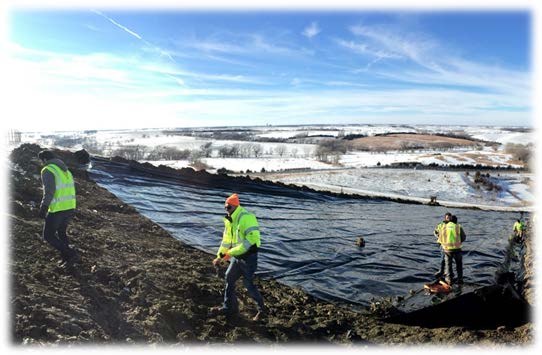
Landfill gas (LFG) is a natural byproduct of the decomposition of organic matter in landfills under anaerobic (no oxygen) conditions. LFG is the third-largest source of methane gas in the U.S. and includes hazardous and strongly odorous gas that is often a nuisance to landfill neighbors, resulting in strained relationships with the community. As one of the alternatives controlling LFG during the operation of a landfill, a co-extruded geomembrane (GM) with an Ethylene Vinyl-alcohol (EVOH) layer sandwiched between two inner low-density polyethylene (LLDPE) layers have been introduced to reduce the LFG emission. This study evaluated the performance of EVOH GM as an intermediate cover to prevent LFG emission by field test, gas emission simulation, and gas dispersion simulation. With that, in-situ emissions of methane among LFG from composite intermediate cover consisting of soils with conventional LLDPE or co-extruded EVOH GM were comparatively evaluated. The field pilot testing site in an operating landfill located in Nebraska was designed and constructed based on minimizing the boundary effect of the cover. Also, transport of odiferous landfill gas [e.g., Hydrogen sulfide (H2S)] was evaluated using the finite element method (FEM) simulating intermediate covers with the gas collection system. The effects of the gas collection system, the type of geomembrane on the gas transport, and the combined condition were separately investigated. Moreover, this study evaluated the impact area of odiferous gas (i.e., H2S) from an operating landfill located in Nebraska installing three different intermediate covers − including soil alone, LLDPE GM, or EVOH GM − and demonstrated the performance of the different cover cases to reduce odor dispersion. The effects of multiple variables, including topographic, meteorology, and gas emission, were considered in the simulation. This study shows that compared with traditional GM, EVOH GM can effectively reduce the emission of LFG and increase the gas collection system efficiency, also can reduce the trouble of odor to nearby residents.
DEPARTMENT OF CIVIL AND ENVIRONMENTAL ENGINEERING